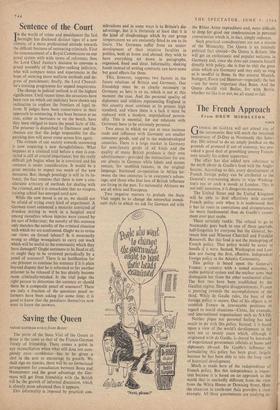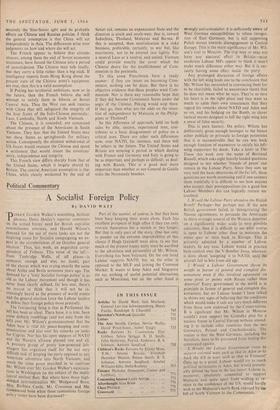The French Approach
From DREW MIDDLF.TON
liENERAL DE GAULLE will not attend any of the ceremonies that will mark the twentieth anniversary of D-Day in Normandy this Satur- day. His refusal to do so, amply justified on the grounds of protocol if not of courtesy, has pro- voked a good deal of grumbling among French- men usually his ardent supporters.
The affair has also added new substance to the myth about de Gaulle's feud with the Anglo- Saxons. According to this, every development in French fOreign policy can be attributed to the General's overweening desire to wipe Washing- ton's eye or cock a snook at London. This is not only nonsense, it is dangerous nonsense.
The United States and the United Kingdom will be able to deal effectively with current French policy only when it is understood that it has its roots in convictions and circumstances far more fundamental than de Gaulle's resent- ment over past snubs.
These certainly rankle. The refusal to go to Normandy goes back to one of those quarrels, half-forgotten by everyone but the General, be- tween him and Winston Churchill and Franklin Roosevelt. But this feud is not the mainspring of French policy. That policy would be easier to handle if it were. Instead, Washington and Lon: don are facing the first, effective, independent foreign policy in the Atlantic Community.
This policy is based upon the General's. France; a country with a sound economy, a stable political system and the nuclear arms that distinguish her from the other continental allies. The first two • have been established by the Gaullist regime. Despite disappointments, France is pressing towards the accomplishment of the third. While de Gaulle rules, the base of the foreign policy is secure. One of his objects is to establish France in irrevocable positions in regard to world situations—China, for example, and international organisations such es NATO.
Neither pique nor personal feeling has had much to do with this policy. Instead, it is based upon a view of the world's development in the next ten or twenty years which, although it originated with de Gaulle, is shared by hundreds of experienced government officials at home and diplomats abroad. De Gaulle's influence in formulating this policy has been great, largely because he has been able to take the long view of historical development.
Much is made here of the independence of French policy. But this independence is impor- tant because it is based on an approach to the world that is markedly different from the view from the White House or Downing Street. Here the situation in south-east Asia provides a clear example. All three governments are studying in- tensively. the Sino-Soviet split and its probable effects on Chinese and Russian policies. I think the general assumption is that China will act independently in Asia. The differences arise over judgments on how and where she will act.
The French appear to believe that circum- stances, among them the end of Soviet economic assistance, have forced the Chinese into a period of consolidation. The Chinese may talk loudly, but they carry a little rather than a big stick. If intelligence reports from Hong Kong about the present state of the Chinese army's equipment are true, then this is a valid assumption.
If Peking has territorial ambitions, now or in the future, then the French believe she will attempt to satisfy them in Siberia or Soviet Central Asia. Thus the West can seek treaties with China that will safeguard the integrity of the four States of the Indo-Chinese peninsula : Laos, Cambodia, North and South Vietnam.
- The Chinese, it is conceded, are concerned about the presence of the Americans in South Vietnam. They fear that the United States may use these States as springboards for military action. Consequently the ultimate withdrawal of US forces would reassure the Chinese and speed a settlement that would insure the countries' unity, independence and integrity.
This French view differs sharply from that of the United. States, which is largely shared by Britain. The central American assumption is that China, while clearly weakened by the end of
Soviet aid, remains an expansionist State and the direction is south and south-west, that is, toward Indochina, Thailand; Malaysia and Burma. If this is accepted, then neutralisation is a risky business, preferable, certainly, to war but, like matrimony, not to be entered into lightly. For a neutral Laos or a neutral, and united, Vietnam could provide exactly the cover which the Chinese desire for the establishment of Com- munism in the peninsula.
To this some Frenchmen have a ready answer: if they are intent on becoming Com- munist, nothing can be done. But there is no objective evidence that these peoples want Com- munism. Nor is there any reasonable hope that, if they did become Communist States under the aegis of the Chinese, Peking would stop there. If they go, then what are the odds on the reten- tion of-independence by Malaysia or the Philip- pines or Thailand?
So this difference of approach, held on both sides by able, sincere, experienced men, con- tributes to a basic disagreement of policy on a critical area. There are other such differences now, over NATO, for instance, and there will be others in the future. The United States and Britain are entering a period in which dealing with France and Germany and Italy is going to be as important, and perhaps as difficult, as deal- ing with Russia. This is a good deal more important than whether or not General de Gaulle visits the Normandy beaches.







































 Previous page
Previous page